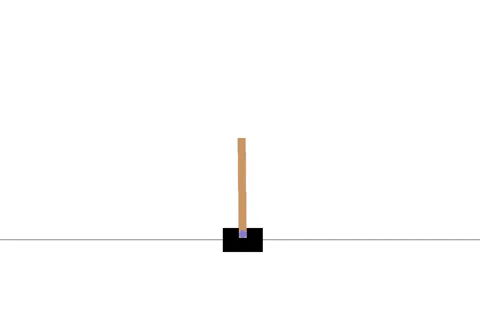None
Actor Critic 方法
作者: Apoorv Nandan
创建日期 2020/05/13
最后修改日期 2024/02/22
描述: 在 CartPole 环境中实现 Actor Critic 方法。
引言
本脚本展示了 Actor Critic 方法在 CartPole-V0 环境中的实现。
Actor Critic 方法
当智能体采取行动并在环境中移动时,它会学习将观察到的环境状态映射到两种可能的输出
- 推荐动作:行动空间中每个动作的概率值。智能体负责此输出的部分称为 actor(执行者)。
- 未来预期奖励:智能体预期在未来获得的所有奖励的总和。智能体负责此输出的部分是 critic(评论家)。
智能体(Actor)和评论家(Critic)学习执行各自的任务,使得 actor 推荐的行动能够最大化奖励。
CartPole-V0
一根杆连接到放在无摩擦轨道上的小车上。智能体必须施加力来移动小车。每当杆保持竖直时,智能体就会获得奖励。因此,智能体必须学习如何防止杆子倒下。
参考文献
设置
import os
os.environ["KERAS_BACKEND"] = "tensorflow"
import gym
import numpy as np
import keras
from keras import ops
from keras import layers
import tensorflow as tf
# Configuration parameters for the whole setup
seed = 42
gamma = 0.99 # Discount factor for past rewards
max_steps_per_episode = 10000
# Adding `render_mode='human'` will show the attempts of the agent
env = gym.make("CartPole-v0") # Create the environment
env.reset(seed=seed)
eps = np.finfo(np.float32).eps.item() # Smallest number such that 1.0 + eps != 1.0
实现 Actor Critic 网络
该网络学习两个函数
- Actor:它接收环境状态作为输入,并返回其行动空间中每个行动的概率值。
- Critic:它接收环境状态作为输入,并返回未来总奖励的估计值。
在我们的实现中,它们共享初始层。
num_inputs = 4
num_actions = 2
num_hidden = 128
inputs = layers.Input(shape=(num_inputs,))
common = layers.Dense(num_hidden, activation="relu")(inputs)
action = layers.Dense(num_actions, activation="softmax")(common)
critic = layers.Dense(1)(common)
model = keras.Model(inputs=inputs, outputs=[action, critic])
训练
optimizer = keras.optimizers.Adam(learning_rate=0.01)
huber_loss = keras.losses.Huber()
action_probs_history = []
critic_value_history = []
rewards_history = []
running_reward = 0
episode_count = 0
while True: # Run until solved
state = env.reset()[0]
episode_reward = 0
with tf.GradientTape() as tape:
for timestep in range(1, max_steps_per_episode):
state = ops.convert_to_tensor(state)
state = ops.expand_dims(state, 0)
# Predict action probabilities and estimated future rewards
# from environment state
action_probs, critic_value = model(state)
critic_value_history.append(critic_value[0, 0])
# Sample action from action probability distribution
action = np.random.choice(num_actions, p=np.squeeze(action_probs))
action_probs_history.append(ops.log(action_probs[0, action]))
# Apply the sampled action in our environment
state, reward, done, *_ = env.step(action)
rewards_history.append(reward)
episode_reward += reward
if done:
break
# Update running reward to check condition for solving
running_reward = 0.05 * episode_reward + (1 - 0.05) * running_reward
# Calculate expected value from rewards
# - At each timestep what was the total reward received after that timestep
# - Rewards in the past are discounted by multiplying them with gamma
# - These are the labels for our critic
returns = []
discounted_sum = 0
for r in rewards_history[::-1]:
discounted_sum = r + gamma * discounted_sum
returns.insert(0, discounted_sum)
# Normalize
returns = np.array(returns)
returns = (returns - np.mean(returns)) / (np.std(returns) + eps)
returns = returns.tolist()
# Calculating loss values to update our network
history = zip(action_probs_history, critic_value_history, returns)
actor_losses = []
critic_losses = []
for log_prob, value, ret in history:
# At this point in history, the critic estimated that we would get a
# total reward = `value` in the future. We took an action with log probability
# of `log_prob` and ended up receiving a total reward = `ret`.
# The actor must be updated so that it predicts an action that leads to
# high rewards (compared to critic's estimate) with high probability.
diff = ret - value
actor_losses.append(-log_prob * diff) # actor loss
# The critic must be updated so that it predicts a better estimate of
# the future rewards.
critic_losses.append(
huber_loss(ops.expand_dims(value, 0), ops.expand_dims(ret, 0))
)
# Backpropagation
loss_value = sum(actor_losses) + sum(critic_losses)
grads = tape.gradient(loss_value, model.trainable_variables)
optimizer.apply_gradients(zip(grads, model.trainable_variables))
# Clear the loss and reward history
action_probs_history.clear()
critic_value_history.clear()
rewards_history.clear()
# Log details
episode_count += 1
if episode_count % 10 == 0:
template = "running reward: {:.2f} at episode {}"
print(template.format(running_reward, episode_count))
if running_reward > 195: # Condition to consider the task solved
print("Solved at episode {}!".format(episode_count))
break
running reward: 8.82 at episode 10
running reward: 23.04 at episode 20
running reward: 28.41 at episode 30
running reward: 53.59 at episode 40
running reward: 53.71 at episode 50
running reward: 77.35 at episode 60
running reward: 74.76 at episode 70
running reward: 57.89 at episode 80
running reward: 46.59 at episode 90
running reward: 43.48 at episode 100
running reward: 63.77 at episode 110
running reward: 111.13 at episode 120
running reward: 142.77 at episode 130
running reward: 127.96 at episode 140
running reward: 113.92 at episode 150
running reward: 128.57 at episode 160
running reward: 139.95 at episode 170
running reward: 154.95 at episode 180
running reward: 171.45 at episode 190
running reward: 171.33 at episode 200
running reward: 177.74 at episode 210
running reward: 184.76 at episode 220
running reward: 190.88 at episode 230
running reward: 154.78 at episode 240
running reward: 114.38 at episode 250
running reward: 107.51 at episode 260
running reward: 128.99 at episode 270
running reward: 157.48 at episode 280
running reward: 174.54 at episode 290
running reward: 184.76 at episode 300
running reward: 190.87 at episode 310
running reward: 194.54 at episode 320
Solved at episode 322!
可视化
训练早期: 
训练后期: 